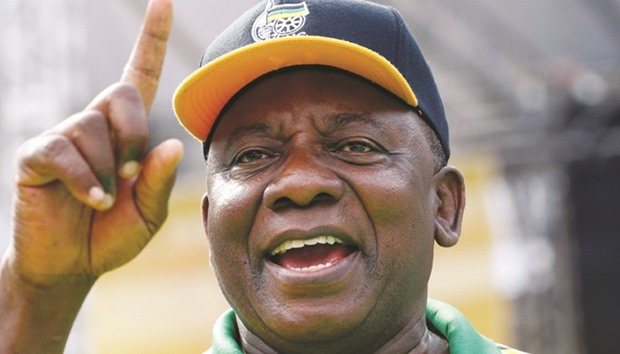Deputy President Cyril Ramaphosa’s chances of becoming the next leader of South Africa got a boost yesterday when a powerful mining union backed him to succeed President Jacob Zuma.
Debates over who should follow Zuma, either when his term ends in 2019 or before, are heating up after the ruling African National Congress (ANC) suffered its worst local election results last month, exposing deep party divisions.
Ramaphosa, 63, would be the first choice for many investors because he is more likely to support pro-business policies than many in the traditionally left-leaning ANC.
A decision has been taken “to support the candidacy of Cyril Ramaphosa for president” (of the ANC), the National Union of Mineworkers (NUM), one of South Africa’s biggest unions, said in a statement.
“It is not only NUM that is gunning for Cyril for president,” general secretary David Sipunzi added, without giving details.
However, Sipunzi said NUM wanted Zuma to see out his second term which runs until 2019.
NUM has around 200,000 members and plays an important role in galvanising public support for the ANC at elections.
Its endorsement of Ramaphosa could encourage other influential trade unions to join its campaign.
The ANC rules in an alliance with the South African Communist Party and trade union group, COSATU, both of which will be influential in lobbying for Zuma’s successor.
COSATU, which played a key role in the fight against white-minority rule and says it represents 2 mn workers, has yet to publicly back any candidate.
“COSATU has not come up with an official position. We must speak to all the unions and come with a clear mandate,” Matthew Parks, COSATU’s Parliamentary Coordinator, told Reuters.
“It is tradition that the deputy takes the position but it is an ANC decision. Unity is paramount, both inside the ANC and between the alliance partners,” Parks added.
Zuma is expected to stand down as ANC president at a party conference late next year, ahead of national elections in 2019 when his tenure as the country’s leader will come to an end.
The ANC has dominated since the end of apartheid in 1994 and is widely expected to retain control at the 2019 vote, making its next leader almost certain to succeed Zuma as president.
Ramaphosa, a wealthy businessman and founding member of NUM, is likely to face strong competition if he does compete for the ANC leadership, including from Zuma’s ex-wife, Nkosazana Dlamini-Zuma, who is currently head of the African Union.
“It’s the start of the campaign and it will gain momentum,” said Gary van Staden, a political analyst at NKC Economics.
“Other COSATU members should line up soon behind Cyril. His prospects are good.”
Dlamini-Zuma, 67, is a Zulu, the largest ethnic group in South Africa, and would likely have the support of Zuma’s powerful voting block within the ANC were she to run.
Ramaphosa comes from the minority Venda tribe.
Around one in five South Africans are Zulu and politicians from Zuma’s home Kwa-Zulu Natal province, a key ANC stronghold, have influence over top party decisions.
Despite their separation, Zuma backed her for the AU job and gave her a position in his cabinet.
Analysts say she would be unlikely to follow up on several high-profile corruption cases that have plagued his tenure.
Zweli Mkhize, a Zulu and the current ANC Treasurer-General, has also been mentioned as a potential party leader.
No ANC member has declared their intention to run for leadership.
Zuma has faced calls to quit from several members of the ANC and prominent business leaders following losses in local elections in August and a string of graft scandals but the party’s top echelons have backed him.
Zuma’s younger brother Michael became the latest to call for his resignation, urging him to quit or risk being killed, without elaborating on any death threats.
Michael Zuma told the Sunday Times people had “robbed” his brother after he was ordered by the constitutional court to repay 7.8mn rand ($571,700) in state funds inappropriately spent on upgrading his country home.
Anti-apartheid campaigner Winnie Madikizela-Mandela, a former first lady and wife of the late Nelson Mandela, said last week that South Africa needed fresh leadership, but did not mention Zuma by name.

Ramaphosa ... endorsed.
